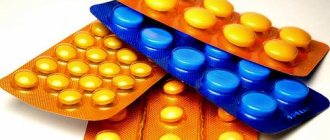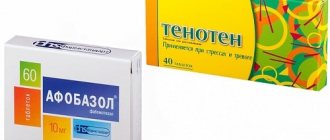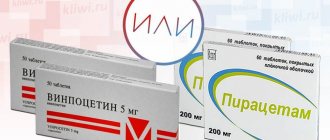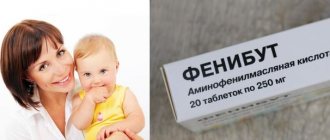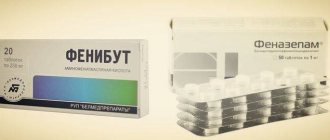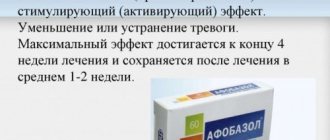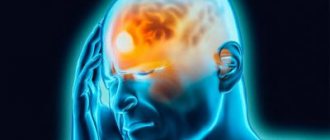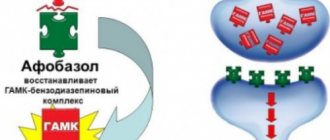Phenibut
This remedy is classified as a nootropic. The medicine has the following main properties:
- normalizes sleep,
- relieves unreasonable anxiety,
- eliminates anxiety.
Phenibut also fights the main manifestations of asthenia:
- headache,
- apathy,
- irritability.
Systematic use of the drug allows you to:
- stabilize blood circulation in the brain,
- increase performance,
- improve memory.
The effect manifests itself very quickly, because a person’s condition noticeably improves after a short period of time. The medication in question is sold in pharmacies only by prescription.
Afobazole or phenibut: which is better and more effective?
Comparing two drugs is a responsible task. Especially when it comes to such well-known drugs as Phenibut and Afobazol. They are widely used in the treatment of various neuroses, anxiety conditions and phobias. To understand which of the two remedies is better and more effective, you need to briefly familiarize yourself with their principle of action, indications and contraindications.
Phenibut
This tool was developed back in the 70s. last century in the Soviet Union. It is a combination of a nootropic drug and an anti-anxiety drug.
Chemically, Phenibut (aminophenylbutyric acid) is a derivative of gamma-aminobutyric acid, a substance involved in many natural processes in the brain.
Aminophenylbutyric acid directly affects GABA receptors in the brain, which facilitates the transmission of nerve impulses in it. Phenibut also has a positive effect on tissue metabolism and improves cerebral circulation.
The product has the following types of action:
- anxiolytic (anti-anxiety),
- hypnotic,
- muscle relaxant,
- sedative,
- nootropic,
- antiplatelet,
- psychostimulant.
Does not affect adrenergic and cholinergic receptors, does not have a teratogenic or carcinogenic effect.
The drug improves microcirculation in brain tissue, increases mental performance, and helps improve information memorization.
At the same time, it is able to relieve stress, reduce symptoms of asthenia, vasovegetative symptoms (headache, heaviness in the head), anxiety and tension.
The medicine effectively improves attention, memory, sensory-motor reactions, and reduces the negative effect of ethanol on the central nervous system.
The drug successfully combats anxiety, neuroses, sleep disorders, the consequences of head injuries, and eliminates increased irritability and lability. The medicine is also prescribed for cognitive and vestibular disorders.
Indications:
- sleep disorders;
- asthenic and anxiety-neurotic conditions;
- anxiety, fears, worry;
- memory and attention disorders;
- tics, urinary incontinence, stuttering in children over 8 years of age;
- speech disorders in adults;
- Meniere's disease;
- decreased emotional activity;
- dizziness associated with dysfunction of the vestibular apparatus;
- as part of comprehensive treatment of alcoholism;
- sedative before medical operations.
The drug can only be purchased with a prescription. The product is approved for use in pediatric practice.
Side effects may include nausea, dyspepsia, abdominal pain, drowsiness or insomnia.
Contraindications include:
- gastrointestinal diseases,
- age up to 8 years,
- pregnancy,
- lactation,
- renal failure.
Since Phenibut is an acid that can irritate the gastric mucosa, it is best to take the medicine after meals.
The drug enhances the effect:
- antiparkinsonian drugs,
- anticonvulsants,
- antiepileptic drugs,
- sleeping pills,
- neuroleptics,
- narcotic analgesics,
- amitriptyline.
It is better not to take the medicine with alcohol, as this may cause side effects.
During therapy, you should refrain from driving a car or using complex machinery, as taking the drug can negatively affect the speed of psychomotor reactions. The drug is produced by various manufacturers in Russia and abroad.
Dosage in adults – 250-500 mg 3 times a day, in children – no more than 250 mg 3 times a day. Duration of treatment is 4-6 weeks, sometimes therapy can be longer. To avoid withdrawal syndrome, therapy is stopped gradually. To prevent motion sickness, take 1-2 tablets one hour before the intended trip.
Afobazole
This is the latest tool developed by specialists of the Russian Academy of Medical Sciences in the 21st century. The active substance of Afobazole is fabomotizole. The manufacturer of the drug claims its anti-anxiety (anxiolytic) effect. Afobazole acts on melatonin receptors and may exhibit the properties of a selective MAO inhibitor. Applicable:
- for the treatment of anxiety disorders, phobias, neuroses, irritability, neurasthenia;
- to combat stress;
- for sleep disorders;
- for adaptation disorders and vegetative-vascular dystonia.
Afobazole is also effective in the treatment of alcohol withdrawal syndrome, premenstrual syndrome, withdrawal syndrome when stopping smoking, and stress associated with somatic diseases (bronchial asthma, angina pectoris, hypertension, IBS).
The medicine is available in pharmacies without a prescription, but it is best to consult a doctor before purchasing it.
Contraindications for the drug: age under 18 years, pregnancy.
Afobazole is recommended to be taken 3 times a day, one tablet (10 mg) after meals. The duration of therapy can be up to 3 months. The drug does not negatively affect concentration and speed of psychomotor reactions.
The drug does not have a withdrawal syndrome. The medicine does not interact with ethanol and may enhance the effect of diazepam. Concomitant use with antidepressants is not recommended.
Manufacturer: Russian.
Phenibut or afobazole – which is more effective?
It is unlikely that such a question should worry the patient. After all, the selection of the drug necessary for treatment in a given situation is the prerogative of the doctor.
Moreover, if Afobazol can still be purchased at a pharmacy on your own, without a doctor’s prescription, then this will not work with Phenibut; it must be prescribed by a specialist.
Therefore, this problem - which of the two remedies is better to use - is relevant only for doctors, and not at all for patients.
Judging by the reviews on various medical websites about these drugs, most patients recognize their effectiveness. However, a certain part of specialists in nervous and mental illnesses - psychiatrists, neurologists, neuropathologists, psychotherapists - disapprove of Afobazole.
Many evaluate it as a too weak drug, having an overly selective effect and applicable only in mild cases. Some tend to attribute its effect to the placebo effect or believe that the drug has no clinical effectiveness.
Others complain that the drug begins to act slowly, around the end of the second week of use, and this is also unacceptable in many cases.
The advantages of Afobazole include its good tolerability, infrequent occurrence of side effects, the absence of sedation characteristic of drugs of the benzodiazepine class, and the ability to drive vehicles during therapy.
Reviews of the effectiveness of Phenibut from specialists are more favorable. Almost no one denies its clinical effectiveness.
Many emphasize the wide spectrum of action of the drug, which is reflected in the possibility of its use simultaneously as a nootropic and anxiolytic agent.
There is also a high speed of onset of action of the drug (from the first days of administration), and the possibility of use in pediatric practice.
Among the disadvantages of the drug, experts include side effects that sometimes occur when taking it, some contraindications, in particular, the inability to use it in people with gastrointestinal diseases, the possible development of withdrawal syndrome, paradoxical reactions in the form of increased arousal, insomnia and irritability.
To summarize, we can say that experts, on average, rate Phenibut more highly. However, it is impossible to say for sure which remedy is the best. After all, Afobazol also has its advantages, and the final word in choosing a drug in each specific case remains with the attending physician. By the way, both drugs combine well and in some cases can be prescribed simultaneously.
Prices for both drugs are affordable for most patients, Phenibut costs 6-10 rubles per tablet, Afobazol – 6 rubles per tablet.
Source: https://medicgo.ru/articles/lekarstva-i-preparati/afobazol-ili-fenibut-chto-luchshe-i-effektivnee/
Phenibut - indications
A drug is prescribed to prevent motion sickness, equally in the presence of dizziness, which is one of the unpleasant manifestations of Meniere's disease. In general, Phenibut helps in the treatment of disorders affecting the vestibular system.
It is also advisable to drink it for those who have been diagnosed with nystagmus. Taking the drug can reduce the severity of symptoms and shorten the duration of involuntary eye rotation.
Neurotic disorders are also an indication for the use of Phenibut. These include:
- emotional instability,
- anxiety,
- obsessive states,
- fear,
- concern.
It is recommended to take medicine to calm you down before surgery or instrumental diagnostics (biopsy, etc.).
Children are prescribed medication for:
- stuttering,
- hyperactivity.
Phenibut has proven its effectiveness during the complex treatment of alcohol withdrawal.
Contraindications
The medicine in question should not be given to children under 3 years of age. Only in very difficult situations is Phenibut prescribed to children. This decision is made by the attending physician.
You cannot take the drug:
- for those who have an individual intolerance to the main and auxiliary components,
- pregnant women in the early stages (1st trimester),
- women during lactation.
Give Phenibut cautiously to patients with:
- liver failure,
- ulcers,
- other erosive pathologies of the gastrointestinal tract.
When taken systematically, the patient may experience the following undesirable effects:
- rash and other signs of allergies,
- dyspepsia,
- dizziness,
- drowsiness,
- migraine.
In very rare cases, the drug causes a reverse reaction in the patient, that is, it enhances:
- anxiety,
- irritability,
- phobias.
As a rule, side effects are observed with overdose or improper use. The duration of the course is a maximum of one and a half months.
An increase in the effect of the following drugs is observed when used with Phenibut:
- sleeping pills,
- antiparkinsonian,
- antipsychotic,
- antiepileptics,
- narcotic anesthetics.
What's better?
In fact, it cannot be said that one medicine is better than another. The drugs are different in composition and active ingredients, although their effect is similar. It all depends on the specific cases of each patient. Sometimes the doctor has to change the prescription of drugs and see which one gives the best effect. The patient himself should pay close attention to the sensations. Everyone’s body is individual, and the nervous system and brain are complex mechanisms. And it is completely impossible to predict their reaction to intervention.
Both Phenibut and Afobazole have excellent therapeutic properties. But which one is better, the doctor must decide individually, assessing all the person’s complaints and his general condition. You cannot prescribe such medications yourself. And it is completely wrong to compare them on the basis of “better, worse.” You need to trust your doctor, and if he chose just such pills for you, then this is justified. If there is no desired effect, you can always replace the medicine with another one.
Sedatives for stress
Sedatives for depression and neurosis
Medicines and pills for fear and anxiety
Afobazole
This drug belongs to the group of anxiolytics. It has a mild effect and is free from the disadvantage of addiction. Withdrawal cessation also does not cause withdrawal symptoms. Its undoubted advantage is considered to be a small number of side effects and their extreme rarity.
Indications include:
- stress,
- anxiety,
- neurasthenia.
These tablets are useful for women with depression and irritability, which often occur before the start of the next menstrual cycle.
Dosage and features of administration
The dosage of the medicine is selected individually by the attending physician. Self-medication can cause side effects and harm the patient’s health, so you should not ignore your doctor’s recommendations.
The drug is not a psychotropic drug and is not addictive. Phenibut works gently, so there is no need to gradually increase the dosage. Treatment begins immediately with the recommended therapeutic dose.
There is no withdrawal syndrome for the drug, since it is not a tranquilizer. However, if you stop abruptly, you may experience some side effects that go away on their own within a few days. This is not due to the body’s addiction, but to the peculiarities of the drug’s action. The active substance supplies the brain with the necessary enzymes to improve metabolic processes. When the drug is abruptly discontinued, these enzymes suddenly stop flowing, and the body does not have time to adapt to producing its own enzymes. This explains the sudden deterioration of the condition after stopping treatment with Phenibut. It takes two to three days to normalize metabolic processes in the body, during which withdrawal symptoms go away on their own.
Side effects
In general, the list of undesirable manifestations is limited to allergic reactions and rare headaches. The drug enhances the therapeutic effect of Diazepam, as well as Carbamazepine.
Is it permissible to take both drugs together?
As evidenced by expert reviews, the simultaneous use of Afobazole and Phenibut can enhance their overall effect. The synergistic effect is not used in normal situations. Only in rare severe cases can a doctor prescribe parallel use of both medications. In this case, the dosage must be adjusted downward.
Description of drugs
Let's proceed to a detailed description of the characteristics of each of the compared drugs. Let's find out whether it is possible to take afobazole and phenibut together, which is what patients ask about.
Phenibut
Phenibut is a representative of the class of nootropics. The use of the medication helps:
- improved sleep;
- eliminating feelings of fear;
- blocking unpleasant symptoms due to mental disorders;
- normalization of blood flow to brain cells.
The action of the medicine occurs quickly, which allows for a noticeable improvement in the patient’s condition almost instantly.
Indications
Experts recommend the remedy in the following situations:
- obsessive states;
- alcohol withdrawal syndrome;
- apathy;
- increased anxiety;
- lethargy;
- Meniere's disease;
- mild depression;
- insomnia;
- neuroses;
- vegetative-vascular dystonia, accompanied by a psychosomatic clinic;
- recovery from traumatic brain injury;
- problems with the activity of cerebral vessels;
- migraine;
- dizziness;
- childhood movement disorders, stuttering, tics, enuresis;
- consequences of shock, severe fright.
Contraindications
Contraindications and restrictions to the use of the medicine are as follows:
- children under 3 years of age;
- pregnancy and breastfeeding;
- renal failure;
- allergic reaction to the components of the drug;
- ulcerative lesions of the gastrointestinal tract.
Side effects
Phenibut is well tolerated, but sometimes the drug has the opposite effect. The patient may experience the following symptoms:
- irritability;
- state of drowsiness;
- feeling of fear;
- dizziness;
- skin rash;
- headache;
- nausea;
- liver and blood problems.
Such adverse reactions occur due to improper use of the prescribed dosage of the medication, as well as during a long course of treatment.
Interaction with other drugs
When Phenibut is combined with antiparkinsonian, hypnotic, antipsychotic and antiepileptic drugs and narcotic analgesics, the effect of the latter drugs increases. Therefore, a similar combination is possible, but after consultation with a doctor.
Afobazole
Afobazole is a representative of the group of axiolytics (tranquilizers). The medication is characterized by a gentle and safe effect on the body. The medicine does not cause addiction or withdrawal symptoms in patients; it has a small list of side effects. Its action is aimed at reducing feelings of fear and anxiety.
Indications
This drug is prescribed in the presence of anxiety conditions:
- adjustment disorder;
- constant feeling of anxiety;
- neurasthenia.
For adult patients with various somatic pathologies, its use is also possible if the following pathologies are diagnosed:
- bronchial asthma;
- arrhythmia;
- IHD;
- hypertension;
- irritable bowel syndrome;
- systemic lupus erythematosus;
- oncological, dermatological and other diseases.
This drug is also used in the treatment of:
- insomnia caused by anxiety;
- neurocircular dystonia;
- premenstrual syndrome;
- to reduce symptoms due to smoking cessation.
Afobazole also has a positive effect on memory, mood, and attention. The patient's emotional background noticeably improves while taking this drug. The condition becomes stable, no worries about irritability, tearfulness, suspiciousness, or excessive sensitivity.
The drug is indicated for persons with asthenic traits, accompanied by increased vulnerability, as well as a tendency to emotional and stressful effects. The positive characteristics of afobazole also include the fact that such a drug does not provoke drowsiness, muscle weakness, and does not have a negative effect on memory and concentration.
When it is discontinued, a person does not experience drug dependence, and there is no “withdrawal” syndrome. Although the effect of the medication is cumulative, it can be noticed only after 5–7 days of therapy. The maximum positive result is achieved only by the end of the month, but it persists after completion of therapy for an average of 14 days.
Side effects and drug interactions
Afobazole, unlike phenibut, is characterized by rare manifestations of adverse reactions of the body and a small list of contraindications. Frequent prohibitions on taking the medicine and unpleasant manifestations due to its use include:
- individual sensitivity in the form of headache or rash;
- acute lactase deficiency;
- age under 18 years;
- period of pregnancy and lactation.
Simultaneous use
Patients often ask whether it is allowed to use phenibut and afobazole at the same time? These drugs, when combined, can enhance each other's effect. But such a treatment regimen should only be determined by the attending physician.
Comparison
If the release forms and indications are similar, the drugs are considered analogues, unless there is a need to treat the effects of stress. When health problems arise due to cerebrovascular accidents, Phenibut is chosen.
Medicines contain different active ingredients:
- Phenibut – aminophenylbutyric acid,
- Afobazole – fabomotizole.
The latter affects the subcortical areas of the brain responsible for emotions, which leads to calm. The first achieves a similar effect by accelerating blood flow.
Afobazole is given exclusively to adults, but Phenibut can also be prescribed to children. It also starts working much faster - the effect is visible within a few hours.
Afobazol is much safer for adults. Its competitor has an unpleasant property - the patient, when taken systematically, very soon gets used to it.
Online magazine about choosing the best goods and services
16.07.2019 16:07:47
Expert: Boris Kaganovich
For various nervous disorders, Phenibut and Afobazole can be prescribed. It’s worth noting right away that they are not analogues, so they have many differences. We looked at their advantages and disadvantages to find out which remedy is best suited for which disorders.
| A drug | Advantages | Flaws |
| Phenibut | + Positive effect on the blood vessels of the brain and the nervous system+ Rapid onset of effect+ Does not cause depression of the central nervous system+ Does not provoke the development of allergies+ Low toxic+ Few contraindications+ Can be prescribed from 8 years | – Not prescribed for diseases of the gastrointestinal tract; – You cannot operate transport or complex machinery during treatment. |
| Afobazole | + Wide range of application+ Does not cause drowsiness+ Does not affect the reaction rate+ Does not lead to withdrawal syndrome+ The result of treatment is visible within 5-7 days from the start of taking the drug+ Dispensed without a doctor’s prescription+ Side effects are unlikely, the list of them is small - allergies and headache + Few contraindications | – Not used in pediatrics, contraindicated for use under 18 years of age – Cannot be prescribed during pregnancy – May cause allergic reactions – Overdose leads to sedation |
The nootropic and psychostimulant drug Phenibut contains the same component in its composition. Manufacturer: Obninsk CFC for Rick-Pharma in the Russian Federation. Available in tablets.
Its dominant actions are antiamnestic and antihypoxic, which allows Phenibut to be used for cognitive impairment, disorders of the vestibular system and for the prevention of the consequences of head injuries.
Additional actions - anxiolytic, antiplatelet, psychostimulant. The drug reduces the manifestations of asthenia, normalizes sleep, eliminates increased irritability and lability. It also helps improve mental and physical performance.
Phenibut is used for memory and attention disorders, to increase initiative and interest. Already from the first days of treatment, it improves the objective well-being of patients with asthenia.
Research and effectiveness
Nootropic drugs have no FDA-approved indications. There is no objective evidence of their effectiveness. Since 1997, only 2 clinical trials of the drug have been conducted. None of the listed indications for use have the specified degree of evidence.
Side symptoms
Side effects during Phenibut therapy may include:
- nausea - often occurs at the beginning of therapy;
- hepatotoxicity – with long-term use in high doses;
- emotional lability, insomnia - observed more often in children.
- If other side symptoms appear, you should talk to your doctor.
Dosage
Phenibut is taken before meals. For asthenia and anxiety, adults drink 250-500 mg 3 times a day. From 8 years - 250 mg 3 times, after 14 years adult doses are used. The maximum dosage is 750 mg, in old age – 500 mg.
An increased dose of 750 mg is used for exacerbation of Meniere's disease, for a one-time elimination of dizziness and vestibular disorders. To prevent motion sickness, use 250 mg 3 times a day.
The duration of treatment varies depending on the disease. The drug can be used for a long course - 4-6 weeks or more.
Phenibut is a low-toxic drug, so an overdose is unlikely. The drug will be hepatotoxic when consumed 7-14 g of the drug per day. Then there may be liver dystrophy and eosinophilia develops. Possible symptoms of overdose are hypotension, nausea, vomiting. There is a risk of kidney failure.
Who is it suitable for?
The medicine Phenibut can be prescribed by a doctor for:
- memory and attention disorders;
- insomnia and other sleep disorders;
- decreased emotional activity;
- tics, urinary incontinence, stuttering;
- Mainer's disease;
- dysfunctions of the vestibular apparatus.
The drug is also used in the complex treatment of alcoholism, when it is necessary to relieve somatovegetative and psychopathological disorders that accompany abstinence.
Description of Afobazole
Afobazole is a tranquilizer based on fabomotizole. Available in tablets. The manufacturing company is Pharmstandard-Leksredstva in the Russian Federation. Can be purchased without a prescription.
The drug gives a psychostimulating effect. The mechanism of action is based on a combination of anti-anxiety and stimulating effects. Reduces anxiety, increased irritability, somatic symptoms of anxiety. Helps with cognitive impairment, stress, and depressed mood. It is especially effective when used for asthenic features.
The effect from the moment the drug is prescribed develops within a week. A lasting result is observed by the end of the month of therapy and lasts for another 14 days. The advantages of the drug are that it does not cause muscle weakness and does not lead to withdrawal symptoms.
To whom is it assigned?
For adults, the drug is prescribed for anxiety conditions and neurasthenia. Can be prescribed for somatic diseases - asthma, IBS, ischemic heart disease, hypertension, arrhythmia, oncological pathologies.
Afobazole can be included in complex treatment for sleep disorders, neurocirculatory dystonia, and abstinence. The product helps to relieve symptoms of PMS and withdrawal symptoms when quitting smoking.
Cost and analogues
| Means | Price | Analogs |
| Phenibut | 250 mg No. 20 – from 80 rubles | Noobut |
| Afobazole | 10 mg No. 60 – from 350 rubles | Substitutes: Adaptol Mebicar |
Which drug is better
Phenibut and Afobazol are produced in Russia, have the same release form, and have some similar therapeutic effects - they help with anxiety disorders. They can be prescribed for the same pathologies, but are not interchangeable.
Phenibut acts more quickly, but has more side effects, can cause withdrawal syndrome, and has a bad effect on the gastrointestinal mucosa. This is a stronger drug that is prescribed for serious disorders. Afobazole is inferior in that it cannot be used before the age of 18.
Afobazole and Phenibut should not be used for self-medication. The use of funds must be justified, so you should first consult your doctor.
Source: https://expertology.ru/sravnivaem-fenibut-i-afobazol-opredelyaem-luchshiy/
What is the difference between Phenibut and Afobazole?
Afobazole is a mild tranquilizer that also has an activating and neuroprotective effect.
The drug contains the substance Fabomotizol, which restores nerve cell receptors, helping the nervous system to work even under prolonged conditions.
nervous tension.
Afobazole eliminates anxiety disorders of various origins, irritability, fear, panic attacks, helps cope with
prolonged stress.
The drug is well tolerated and does not cause drowsiness, dependence or addiction, and has a long-lasting effect that manifests itself even after discontinuation of the drug.
It should be noted that the drug does not interact with ethanol and can be used in complex treatment with other sedative and anti-anxiety drugs (however, when combining different
medications, you should still consult your doctor).
Phenibut contains aminophenylbutyric acid and is classified as a nootropic and anti-anxiety drug. That is, the drug not only has a calming effect, but also improves the functional state of the brain
due to the normalization of tissue metabolism and the effect on cerebral circulation.
Please note that Phenibut may cause discomfort if discontinued abruptly.
the drug, therefore stop its use gradually.
Phenibut should also be used with caution by those patients who have problems with the gastrointestinal tract, because this drug has an irritating effect on the mucous membranes.
Therefore, if any discomfort in the stomach or other side effects occurs, you should discontinue the drug or immediately
Consult your doctor as this is a prescription drug.
Is it possible to take Phenibut and Afobazole together?
The compatibility of these drugs raises many questions, or rather the possibility of taking them at the same time. Afobazole and phenibut enhance each other's anti-anxiety effect. They are compatible and there are a number of situations in which they can be taken together:
- insufficient anti-anxiety effect of one of the drugs;
- the presence of depressive disorders against the background of various acute and chronic brain diseases (cerebral circulatory disorders, trauma, inflammation) - such conditions are always difficult to correct, and since phenibut has a more pronounced vascular effect, it will harmoniously complement the effect of afobazole;
- disorders of the internal organs caused by depression and anxiety: such problems indicate prolonged stress, poor mental stability, they have a protracted course and are difficult to correct with one drug;
- fear of flying, traveling by car in combination with motion sickness: the double anti-anxiety effect will be more effective, and phenibut will reduce the symptoms of motion sickness.
When using phenibut and afobazole together, there is no need to space the intake over time, however, it is often necessary to reduce the average dose of the drugs so as not to provoke the development of side effects. Any treatment adjustments must be made by a doctor.
Which is better Afobazol or Phenibut: reviews
In order to find out which drug is best suited in your case, you need to consult with your doctor, because unlike Afobazole,
which can be purchased at a pharmacy without a prescription, Phenibut requires a doctor's prescription.
You can also read reviews about Afobazole or Phenibut on the Internet to understand exactly what effect a particular medicine causes.
There are many different reviews about Phenibut: some patients say that after taking this drug they felt better and note a good anti-anxiety effect, however, there are also those who absolutely do not like the drug
approached and caused severe side effects.
There are also neutral reviews about the drug, when it did not help, but did not cause any discomfort.
Afobazole has mostly positive reviews; patients say that it effectively eliminates anxiety, panic attacks, irritability, and helps restore the nervous system under conditions of constant stress. Patients also note that the drug is well tolerated and does not cause drowsiness, apathy, muscle weakness, unpleasant side effects or condition
decreased concentration.
Analyzing patient reviews about which drug is more effective, it can be noted that the majority appreciate the effect of phenibut and the rapid onset of its action. However, the drug often produces side effects such as drowsiness, lethargy, and sometimes the opposite manifestations: agitation and anxiety.
What is more effective: Phenibut or Afobazole?
The drugs are very different in composition. And often the effectiveness of prescribing Phenibut or Afobazole depends on the patient’s condition. If everything is in order with cerebral circulation, then it is better to use Afobazole, which is a modern and safe drug, is better tolerated and helps not only to calm the nervous system.
system, but also effectively protect it from prolonged stress.
Conclusions about the comparison of drugs, we write a conclusion.
Unlike Phenibut, Afobazol is a modern drug, has a mild neuroprotective effect, at the same time calms and restores nervous
cells, protecting them from damage.
Afobazole is the best choice for long-term constant stress; it helps the body cope with stress on its own. The drug does not cause deterioration in concentration, decrease in blood pressure, weakness, is well tolerated by patients, the effect of its use is also preserved
and after finishing taking the drug.
Source: https://remson58.ru/afobazol-fenibut-prinimat-vmeste/


